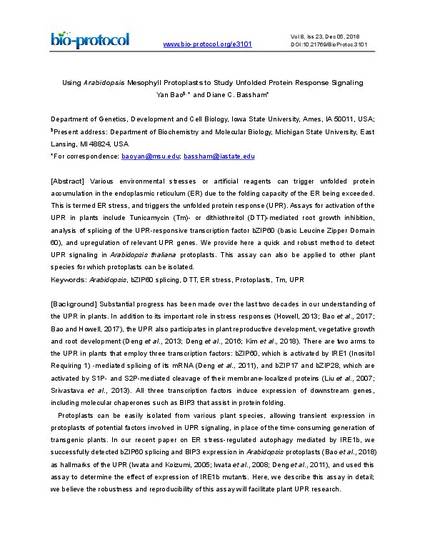
Article
Using Arabidopsis Mesophyll Protoplasts to Study Unfolded Protein Response Signaling
Bio-protocol
Document Type
Article
Disciplines
Publication Version
Published Version
Publication Date
12-5-2018
DOI
10.21769/BioProtoc.3101
Abstract
Various environmental stresses or artificial reagents can trigger unfolded protein accumulation in the endoplasmic reticulum (ER) due to the folding capacity of the ER being exceeded. This is termed ER stress, and triggers the unfolded protein response (UPR). Assays for activation of the UPR in plants include Tunicamycin (Tm)- or dithiothreitol (DTT)-mediated root growth inhibition, analysis of splicing of the UPR-responsive transcription factor bZIP60 (basic Leucine Zipper Domain 60), and upregulation of relevant UPR genes. We provide here a quick and robust method to detect UPR signaling in Arabidopsis thaliana protoplasts. This assay can also be applied to other plant species for which protoplasts can be isolated.
Copyright Owner
The Authors
Copyright Date
2018
Language
en
File Format
application/pdf
Citation Information
Yan Bao and Diane C. Bassham. "Using Arabidopsis Mesophyll Protoplasts to Study Unfolded Protein Response Signaling" Bio-protocol Vol. 8 Iss. 23 (2018) p. e3101 Available at: http://works.bepress.com/diane-bassham/35/

This article is published Bao, Yan, and Diane C. Bassham. "Using Arabidopsis Mesophyll Protoplasts to Study Unfolded Protein Response Signaling." Bio-protocol 8, no. 23 (2018) e3101. doi: 10.21769/BioProtoc.3101. Posted with permission.